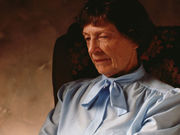Greatest odds of depressive symptoms for adults with nuclear cataract and those with less education
FRIDAY, Dec. 9, 2016 (HealthDay News) — Age-related cataract is associated with increased odds of depressive symptoms, according to a study published in the December issue of Optometry and Vision Science.
Haifang Wang, from the First Affiliated Hospital of Soochow University in Suzhou, China, and colleagues conducted a community-based survey of 4,611 Chinese adults aged 60 years or older to examine the correlation between age-related cataracts and depressive symptoms. The nine-item Patient Health Questionnaire depression scale was used to measure depressive symptoms in 4,597 study participants; age-related cataracts were graded clinically using the Lens Opacities Classification System III scheme.
The researchers found that, compared to adults without cataract, adults with cataract had higher odds of having depressive symptoms after adjustment for age, gender, educational level, monthly income, living alone, smoking, alcohol intake, tea consumption, sleep hours per day, and presenting visual acuity (odds ratio, 1.33). The risk of depressive symptoms did not differ significantly for those with bilateral and unilateral cataract. The greatest odds of cataract symptoms were seen for adults with nuclear cataract. The odds of having depressive symptoms were greater for cataract patients with less education versus those with higher levels of education.
“Age-related cataract was related to the presence of depressive symptoms among older adults, particularly in poorly educated ones,” the authors write. “It may be recommended that efforts and resources be channeled towards the surgical treatment programs of cataract in depressive adults.”
Full Text (subscription or payment may be required)
Copyright © 2016 HealthDay. All rights reserved.








